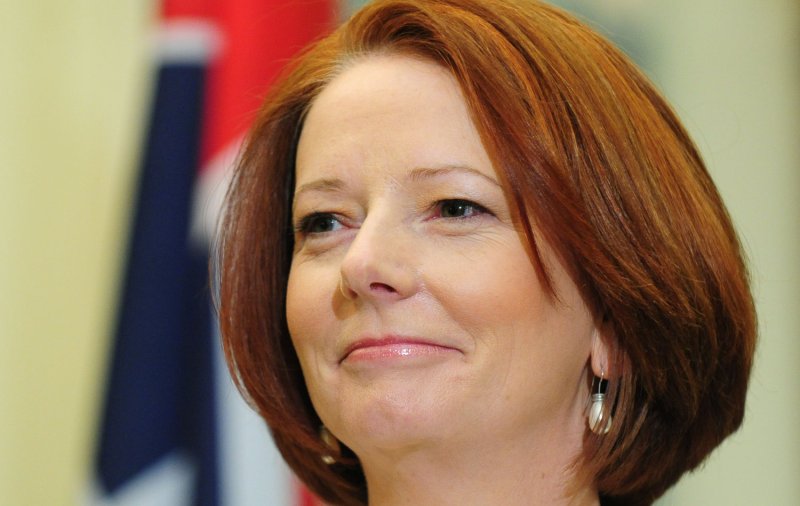1 of 2 | Prime Minister Julia Gillard of Australia speaks during a joint press availability with Sen. John McCain (R-AZ) on Capitol Hill in Washington on March 8, 2011. UPI/Kevin Dietsch |
License Photo
CANBERRA, Australia, Feb. 24 (UPI) -- Australian Prime Minister Julia Gillard announced a leadership ballot after her foreign minister resigned this week, saying he wanted to regain the top Labor Party job.
Labor Party members are to be polled Monday morning, Gillard said in a national television broadcast.
She also said she expects former Foreign Minister Kevin Rudd -- the man she succeeded for the party leadership in 2010 -- to run against her. Rudd served as prime minister from December 2007 until June 2010.
But Gillard threw down the gauntlet to Rudd, challenging him to do as she would do if she loses the ballot, that is, retreat to the Labor Party back benches in Parliament.
Such a move would put Gillard effectively out of contention for any senior ministerial posts in future Labor governments.
Gillard said her snap decision for a leadership ballot, only hours after Rudd's resignation, is designed to end incessant Labor party "squabbling" that is distracting the party from running of the country. And there isn't an Australian general election scheduled until 2013
A decisive leadership ballot is in the interest of the party and Australia that the leadership is settled "once and for all," she said.
She said she expects to receive the backing of the party but "should I not receive the support of my colleagues then I will go the back bench and renounce any further ambition for the Labor leadership. I ask him (Rudd) to give the same undertaking."
"I am confident that ... we can win that election provided we use Monday's opportunity to end this for all time and then we get on with the job of delivering good government for the Australian people," Gillard said.
The internal party battle will be a struggle between two very different people, an opinion article in the Business Spectator newspaper said.
"Rudd has excellent stagecraft, which helps explain his personal popularity," Robert Gottliebsen said in the Spectator. "He timed his resignation as foreign minister for the 6 p.m. TV news. It was brilliant stagecraft."
But during his term as prime minister, Rudd couldn't efficiently run a Cabinet meeting and the business of government, Gottliebsen said.
"The vast majority of the current Cabinet suffered through the Rudd chaos which is why he lost his job and do not want to do it again," Gottliebsen wrote.
In contrast, Gillard is excellent at running a Cabinet, he said, adding, "She has deep support from most Cabinet ministers. Conversely, she has limited stagecraft to woo public opinion."
Rudd, also in a televised broadcast, said he took the decision to resign after discussions with many of his backers who say he is the best person to lead Labor to a victory in 2013.
He also urged restraint on personal attacks, saying "whatever our different political views, across the Australian political landscape, there is a place for civility."
With only a weekend to go before the ballot, there is little time for mudslinging.
Nonetheless, the personal aspect of the battle won't be far from the surface, said David Marr, a senior writer with The Age newspaper.
Questions will be asked about Rudd's ability to delegate power to Cabinet ministers, as were asked before he lost the last leadership contest.
Rudd won a landslide Labor victory in 2007 but became a political liability when his poll ratings plummeted. He lost the leadership vote to his deputy, Gillard.
The ruling party in Australia has the right to designate who leads the party, becoming prime minister, by internal appointment or ballot.
When Gillard was elected Labor leader by party members, she quickly called a general election so Labor had a mandate to govern under her prime ministership.





